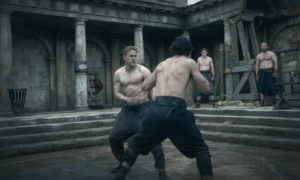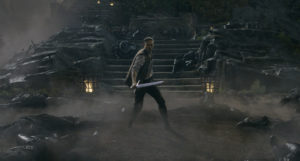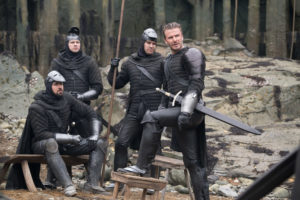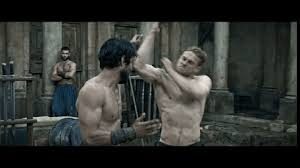By Drs. Craig and Silvia Reid

It’s time for me (Craig) to come out of the writing closet. Being an Englishman raised by God-fearing Scots parents in the Southern part of England, that’s way I constantly say, “You all,” I often failed writing class because I just couldn’t grasp onto the rules of writing, which was due to the 30 pills/day, mind-altering medications I was taking to keep my cystic fibrosis in check. Yet every writing teacher I had was blown away by my creativity and imagination…but back in the ’60s and ’70s, these weren’t considered an important part of the traditional writing process.
One of my childhood heroes was King Arthur and I recall writing an elongated, 20-page essay assignment (’twas supposed to be one page) of me rambling on about my version of the Legend of King Arthur, who he was, how he learned to fight and then how with his superior fighting skills was able to destroy any evil creature or person who tried to destroy Britain.
 Guy Ritchie’s King Arthur: Legend of the Sword is the closest thing I’ve seen to what I imagined was the real legend, yet even his re-imagining falls short of my 10-year-old, medication stupored mind. The cool thing is, when I began watching martial arts films beyond Bruce Lee, movies based on old wuxia stories and legends as well as tales about the Chinese world of Jiang Hu and their knight errant swordsmen heroes, I felt at home.
Guy Ritchie’s King Arthur: Legend of the Sword is the closest thing I’ve seen to what I imagined was the real legend, yet even his re-imagining falls short of my 10-year-old, medication stupored mind. The cool thing is, when I began watching martial arts films beyond Bruce Lee, movies based on old wuxia stories and legends as well as tales about the Chinese world of Jiang Hu and their knight errant swordsmen heroes, I felt at home.
I imagined that maybe in the British tales of yore, there existed similar worlds of morality and swordsmanship in jolly olde England. Of course though, these were just my thoughts and imagination acting out. It wasn’t until I saw the fant-Asian genre of Hong Kong actions films that arose in 1982, where the kung fu heroes and villains had amazing flying and leaping abilities, ultra amazing weapon and sword fight…they really struck a nerve in regard to my early concepts of the Arthurian legend and how he fought and wielded his sword.
 Swords are a symbol of bravery, justice and honor. Chinese folklore describes that swords have names and after they taste blood they develop a spirit. In Chinese film, a sword’s high-pitched shinng when drawn dramatizes this spirit. They’re not weapons but living entities and they’re not an extension of the hand, they are the hand. I had found Excalibur’s brothers, which made the legends of King Arthur seem more real and alive to me. In Legend of the Sword, Ritchie reflects this spirit when during a fight, Arthur had to pull Excalibur out of a cement pillar and did so with a loud, resonating shinnnng. Right on man.
Swords are a symbol of bravery, justice and honor. Chinese folklore describes that swords have names and after they taste blood they develop a spirit. In Chinese film, a sword’s high-pitched shinng when drawn dramatizes this spirit. They’re not weapons but living entities and they’re not an extension of the hand, they are the hand. I had found Excalibur’s brothers, which made the legends of King Arthur seem more real and alive to me. In Legend of the Sword, Ritchie reflects this spirit when during a fight, Arthur had to pull Excalibur out of a cement pillar and did so with a loud, resonating shinnnng. Right on man.
 If the name of the character played by Charlie Hunnam in Legend of the Sword was renamed Excalibur, then one slapped on the X-Men label with a story about sensibility, then everyone and their pet cat would demand a sequel on how Excalibur became part of the X-Men to battle evil in the United Kingdom, the U.S.A and the world.
If the name of the character played by Charlie Hunnam in Legend of the Sword was renamed Excalibur, then one slapped on the X-Men label with a story about sensibility, then everyone and their pet cat would demand a sequel on how Excalibur became part of the X-Men to battle evil in the United Kingdom, the U.S.A and the world.
I’m betting that many American critics won’t like this film because they mostly will know nothing about the real King Arthur, his legend and what he did for England.
Let’s look at who King Arthur was and how did the stories about him evolve.
 King Arthur is a legendary British leader who led the fight against Saxon invaders in the late 5th and early 6th centuries AD. The details of Arthur’s stories and accomplishments are seeped in folklore and perhaps literary invention made famous over 500 years later by the imaginings of Geoffrey of Monmouth’s in his book History of the Kings of Britain (1138). Some tales of yore and gore tell that Arthur was a great warrior that used his superlative fighting skills to defend ancient Britain from human and supernatural enemies.
King Arthur is a legendary British leader who led the fight against Saxon invaders in the late 5th and early 6th centuries AD. The details of Arthur’s stories and accomplishments are seeped in folklore and perhaps literary invention made famous over 500 years later by the imaginings of Geoffrey of Monmouth’s in his book History of the Kings of Britain (1138). Some tales of yore and gore tell that Arthur was a great warrior that used his superlative fighting skills to defend ancient Britain from human and supernatural enemies.
 Other parts of Arthur’s life in Geoffrey’s treatise include Arthur’s dad Uther Pendragon, Arthur’s wife Guinevere, his sword Excalibur, Merlin the Magician, his final battle against Mordred and Arthur’s final resting place in Avalon.
Other parts of Arthur’s life in Geoffrey’s treatise include Arthur’s dad Uther Pendragon, Arthur’s wife Guinevere, his sword Excalibur, Merlin the Magician, his final battle against Mordred and Arthur’s final resting place in Avalon.
French writer Chrétien de Troyes, later added Sir Lancelot, the Holy Grail and the various Knights of the Round Table to the legend. Ritchie’s film covers most of these talking points too as well as added in a few more perhaps, self-indulgent ideas and visions to the King Arthur legend.
 So, if the legend of King Arthur appeared in print over 500 years after his death by writers who never knew him, were never in Camelot and basically sat down and created the story based on early accounts handed down from generation to generations as anecdotes kept alive by traveling storytellers, how do we know if they’re true? It’s believed that these oral accounts were passed on with great detail and accuracy.
So, if the legend of King Arthur appeared in print over 500 years after his death by writers who never knew him, were never in Camelot and basically sat down and created the story based on early accounts handed down from generation to generations as anecdotes kept alive by traveling storytellers, how do we know if they’re true? It’s believed that these oral accounts were passed on with great detail and accuracy.
Does any of this sound familiar? This is how the bible was written, 500 years or so after the birth of Christ. I’m just saying. Fantasy, reality, legend, how do we draw that line?
When we get right down to the film and King Arthur’s legend, the key character is Excalibur and this is why King Arthur’s sword fights are an essential and important component of the film. On this, in my opinion, the movie truly delivered. With each escalating fight it was all about Arthur learning from his weapon…or maybe vice-versa?
 Hunnam, who put on 20 lbs of muscle for the role reflects, “I’ve never done sword fighting. Guy and I talked a lot about Arthur as a feral street kid, a starving wolf-type, with the idea that he had grown up fighting and that he had a hunger to him, but also an underlying nobility deep down. I was really intent on finding a physical way to show that. I’d done martial arts training and fight training in the past, and it does give you a certain confidence, so I spent a lot of time in the gym, not only for the physical effect but for the emotional effect that comes with throwing a thousand punches a day.
Hunnam, who put on 20 lbs of muscle for the role reflects, “I’ve never done sword fighting. Guy and I talked a lot about Arthur as a feral street kid, a starving wolf-type, with the idea that he had grown up fighting and that he had a hunger to him, but also an underlying nobility deep down. I was really intent on finding a physical way to show that. I’d done martial arts training and fight training in the past, and it does give you a certain confidence, so I spent a lot of time in the gym, not only for the physical effect but for the emotional effect that comes with throwing a thousand punches a day.
 “Yet the relationship between Arthur and Excalibur was key,” he affirms. “The sword had to aid in the narrative as well as have a visual impact, and the challenge was balancing those two elements. Is the sword in charge, or is Arthur? As he develops control over it, that relationship changes, therefore the effects should reflect that. So, in every sequence the effects of the sword actually change as Arthur gets more in tune with Excalibur, and with himself.”
“Yet the relationship between Arthur and Excalibur was key,” he affirms. “The sword had to aid in the narrative as well as have a visual impact, and the challenge was balancing those two elements. Is the sword in charge, or is Arthur? As he develops control over it, that relationship changes, therefore the effects should reflect that. So, in every sequence the effects of the sword actually change as Arthur gets more in tune with Excalibur, and with himself.”
Rule Britannia! King Arthur rules the waves. Britons never, never, never shall be slaves. Rock on Ritchie.